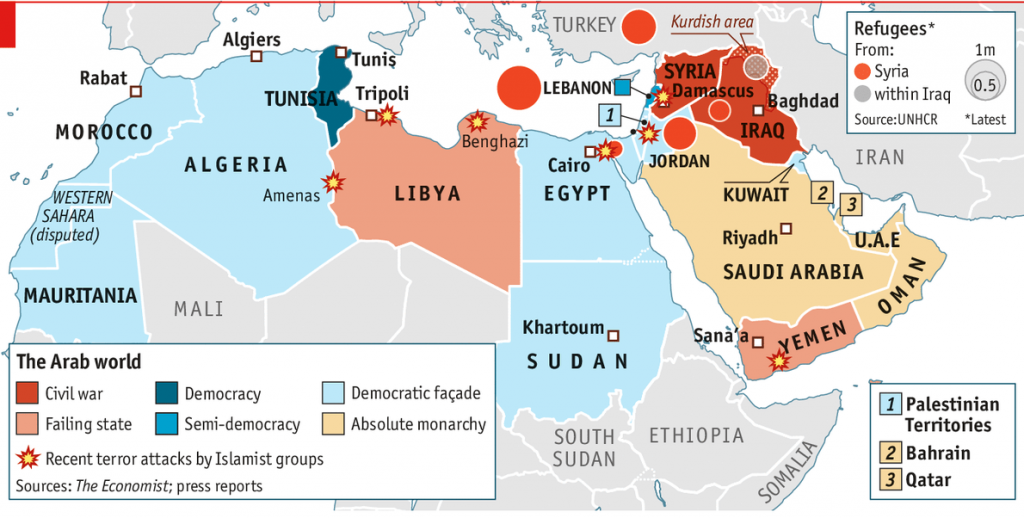Resignation or interventionism are a license for war

On this map in The Economist (July 2014) Israel has been given up and is already a part of Arab Palestine
The Middle East is on fire, from Libya to Iraq and from Turkey’s southern border to Sudan. States including Syria, Libya and Sudan are falling apart. With the exception of Tunisia, the liberation movements of the Arab Spring have all been crushed by reactionary or fundamentalist forces. These facts need to be recognized by decision-makers outside the region before they develop new strategies for the area or stick stubbornly to old ones. One example of this is the idealistic but uninspired Middle East peace initiative by US Secretary of State John Kerry. Before the violence can be stopped, one has to take stock of what has happened. This is the basis on which a realistic vision for peace can emerge. To turn it into reality, resolve, power and diplomatic finesse will be required. This applies especially to external mediators in this conflagration at Europe’s doorstep. Currently we are seeing that only countries with a coherent history such as Egypt and Iran can maintain a certain territorial integrity – which, however, says nothing about their domestic political stability. Efforts toward peace and democracy in these countries have proven – despite the popular movements that arose – not yet strong enough to overcome the forces of inertia such as the army and fundamentalist religious groups. The former regime of the Muslim Brotherhood in Egypt and the clerical establishment in Iran have shown that by no means do majorities won in general elections produce democracies when human rights are violated and the separation of religion and state is refused. This leads, instead, to domestic oppression and external aggression.
Sacred soil
The current crises demonstrate moreover that, even after a century of existence, states established by the colonial powers Britain, France and Italy such as Syria, Lebanon, Iraq and Libya do not have the cohesive power to stand up to massive centrifugal forces domestically and to foreign pressures. Even the Ba’ath dictatorship in Syria, regardless of its brutal use of force, is unable to do so. That goes also for the Maliki government in Iraq, which is marked by the blemish of having been established under the protection of the West, and especially the United States. The Arab-Israeli-Palestinian conflict has been perpetuated bitterly for nearly a century now. The essential factor here is that Zionism is understood on the Arab side as a Western, imperialist movement and that the “occupation of sacred Islamic soil by Zionists in Palestine,” as Yasser Arafat once put it, is regarded as sacrilege by Muslims worldwide. Jewish Israelis, for their part, are convinced that they must defend the existence of their state when necessary by the use of force. Auschwitz did not make pacifists out of the Jews. Instead it affirmed their belief that powerlessness just delivers them to their enemies. To ensure a minimum of stability in the Middle East, today there should be no efforts to redraw the existing national boundaries drawn up by colonial powers. This would lead to anarchy in the region. Its beneficiaries would be fundamentalist terrorist organizations such as the “Islamic Caliphate” in Syria and Iraq. States such as Jordan, Lebanon, Libya and Algeria would descend into civil war and collapse, as so many African states have already done. Instead, the existing states must be buttressed, though not with military interventions, let alone occupations, associated with arms deliveries. Instead we need internationally supported agreements within the individual states. It will take patience and the understanding of domestic circumstances. One example is that Egypt’s former general Abdel Fattah el-Sisi is tolerated by the majority of Egyptians and neighboring states, even if he is anything but a bona fide democrat. Essentials also have to be taken into account in the Israeli-Palestinian conflict. These are
A political foundation
A decisive complement to these building blocks must be an agreement by the five permanent Security Council members plus Germany with Iran. It cannot be reduced to the level of a “technical” pact. Technical details can be bypassed. The decisive element must be the political foundation. If Tehran wants sanctions to be lifted and to be treated as an equal member of the family of nations, then Iran must respect its rules and recognize Israel’s right to exist. If it does not, the clerical regime will continue striving to eliminate the Jewish State. Signs of resignation have become apparent in the West. The Economist recently included a sketch showing Israel as Palestinian territory. If this tendency continues, the entire region will break up. It is a license for wars. Peace, or at least stabilization, is possible, yet neither through resignation nor interventionism, but solely through a patient yet firm policy of reason.
